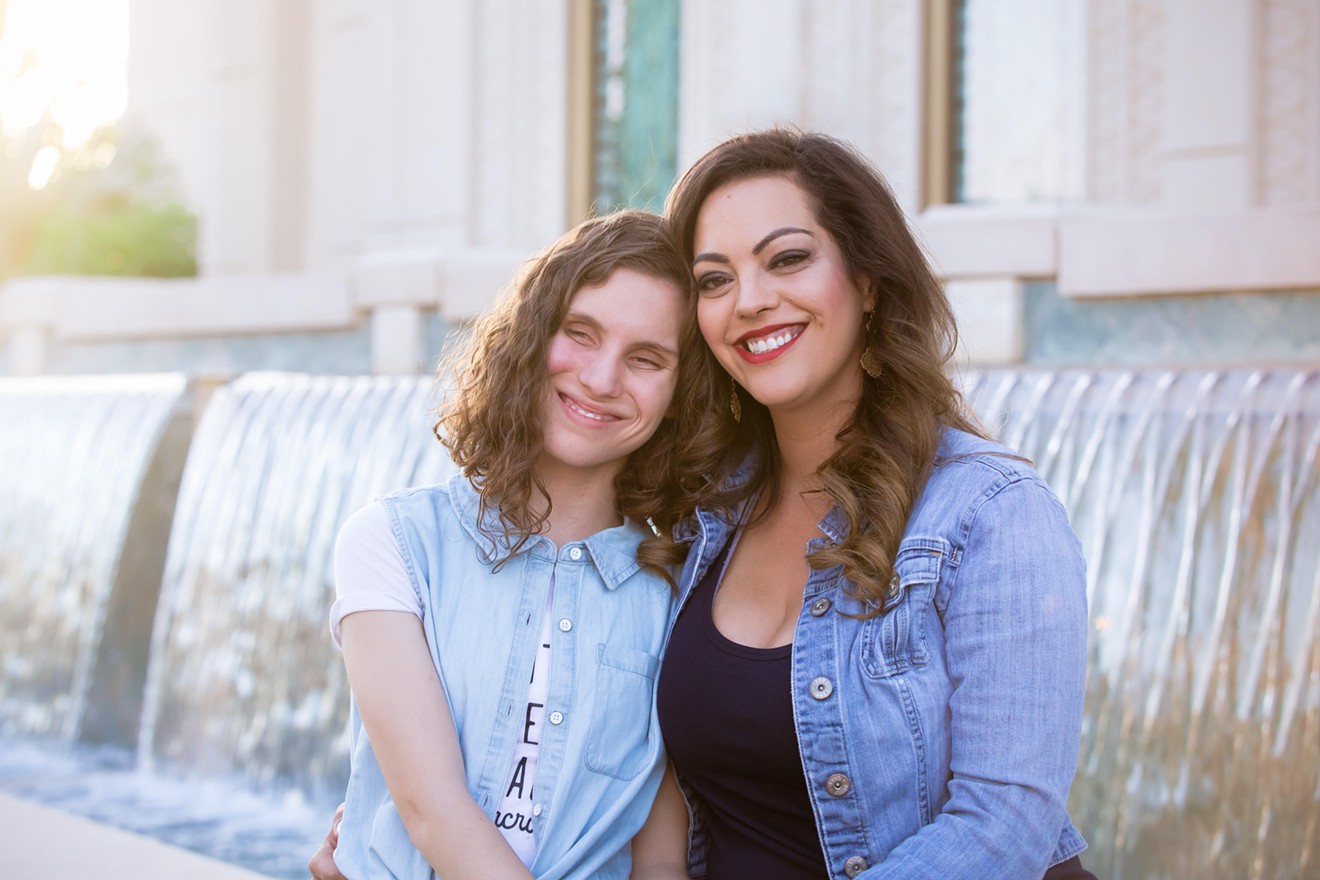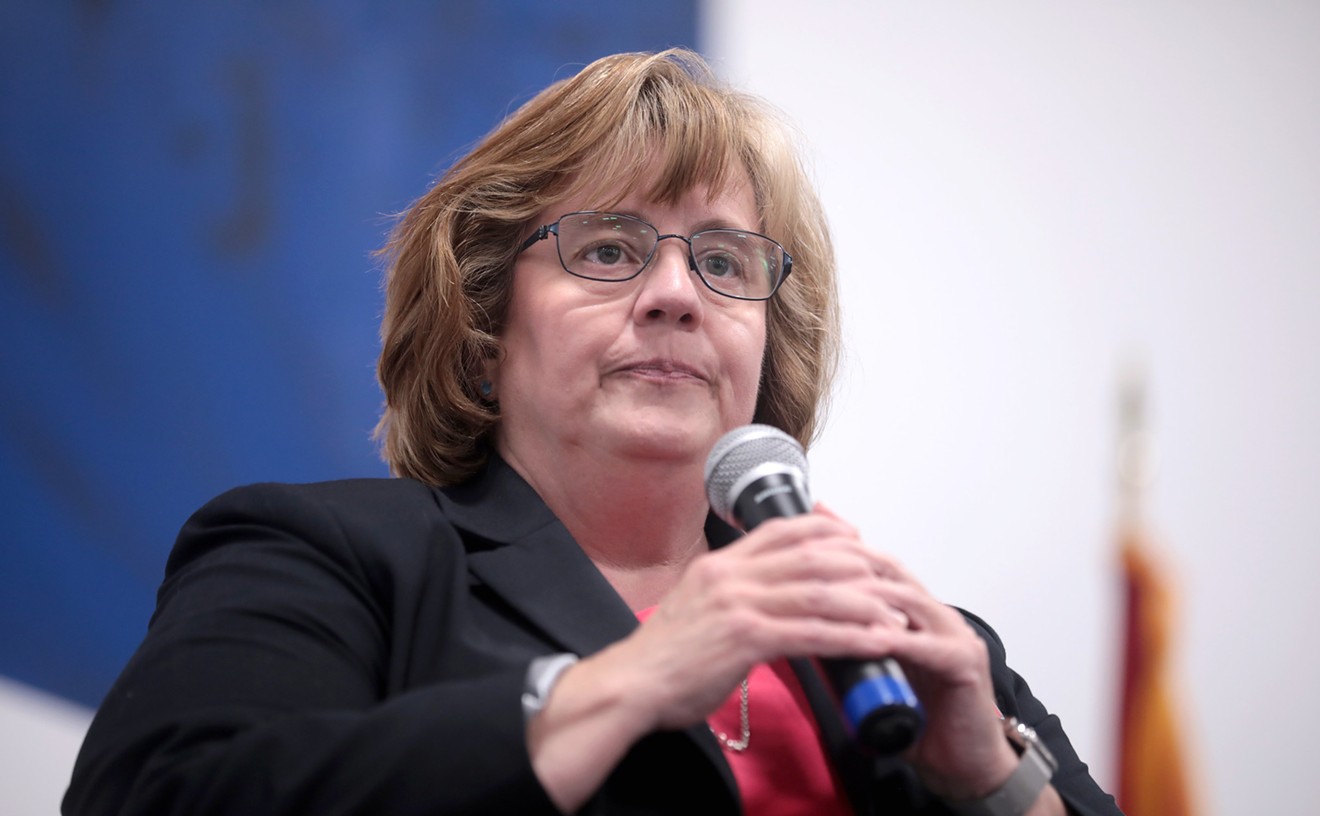Cannabis became a key part of Parisa Mansouri-Rad's life three years ago following her 16-year-old daughter Yazy's spinal fusion surgery.
Complications arose after the surgery and Yazy came down with a rare, chronic digestive condition in which part of her small intestine is compressed by two arteries. It's incredibly painful and causes daily nausea. Yazy is sightless and has cerebral palsy. The new condition on top of her other disabilities meant she was confined to her bed, attached to feeding tubes, for several months after she got out of the hospital.
Ever since then, cannabis has been part of Yazy's treatment regimen. With her mother's help, she uses products made from cannabis extracts legally under Arizona law to reduce how many times a day she dry-heaves, and to lessen her abdominal pain.
However, Yazy may face an imminent return to extreme nausea and pain because of last week's divided ruling by the Arizona Court of Appeals, which declared that the resin in medical marijuana, when extracted from the plant, is not protected under the state's Medical Marijuana Act.
After hearing of the news last week, Mansouri-Rad said she grew "terrified." She picked up the phone immediately and called the state Department of Health Services, which oversees the state's medical-marijuana program.
"They just said they feel for me but they have no control over this," she said. "I was in tears. Do they realize the lives they're messing with?"
Many patients remain worried and confused over the June 26 ruling, if not frantic. Lawyers were taking urgent calls from dispensary operators who wondered if they were at risk of a raid. Dispensary managers debated whether they should pull popular products from their shelves. And patients wondered how they'd get by if their most effective and favorite medicinal products were to disappear.
The state's medical cannabis community currently includes 170,000 patients and about 130 state-authorized dispensaries. Experts said law enforcement and prosecutors will probably take no steps until the matter is settled by the Arizona Supreme Court, whenever that may be.
For the time being, many dispensary companies and concentrate manufacturers have vowed to keep selling products with extracts. Such products, which include THC oil, vape pen cartridges, shatter, and edibles, are often used by the sickest and most needy patients, because they allow consumers to forego smoking. Concentrates are also more potent, gram-for-gram, meaning patients can consume less to achieve the same effect.
Cannabis "was the one thing that changed everything for us," Mansouri-Rad said.
Yazy uses THC-infused topicals, eats food products that contain a THC distillate, and periodically puffs on a vape pen filled with hash oil for immediate relief. The medical-marijuana products help reduce how many times a day Yazy dry-heaves, and they help with her pain.
"Concentrates are the main form of all of Yazy's medicine," Mansouri-Rad said. "This is the best, most effective regimen for her."
Mansouri-Rad became more than an advocate for cannabis after seeing how well Yazy responded to cannabis treatment. The marketing professional started a consulting business that helps other parents of disabled kids and tries to help marijuana go mainstream.
On Monday, she said she's teamed up with 17 other families who plan to file a lawsuit against the state that would ensure patients are not arrested for possessing cannabis extracts.
"They'll do whatever it takes to get the medicine they need," she said.
J.P. Holyoak, the principal operator of two metro Phoenix dispensaries, treats his daughter, Reese, with cannabis extracts. She's got Aicardi syndrome, a rare condition that often results in death by age 8. But she's beaten the odds and is now almost 10.
"This ruling, if it holds, is a death sentence for Reese," Holyoak said.
Parents like him and their supporters won't sit quietly if the ruling isn't reversed, Holyoak promised.
"This is going to make Red for Ed look small," he said.
Another parent of a young cannabis patient said she was "extremely" fearful of what might happen next.
Brandy Williams' son, 8-year-old Logan, has self-destructive tendencies caused by his autism. Before his treatments, he'd bang his head on a table 100 times a day, sometimes lashing out at his mother or his other caretakers with his teeth or fists. Like Mansouri-Rad, Williams also became a professional cannabis advocate, and now runs the state chapter of a national group, Mothers Advocating Medical Marijuana for Autism.
Williams buys cannabis flowers and extracts the "sticky tar" of resin herself, giving Logan 5-milligram microdoses in the morning and afternoon.
"This year he went to public school the whole year," she said. "He's reading now. He's in a play."
Yet because of the ruling, some patients like Logan may already be going without. Some small-town dispensaries have decided they won't take a risk by selling the extracts.
Kompo Care in Taylor waited a week for guidance from the state, hoping a grace period would be announced. But state officials haven't yet said if they'll change the program. So Kompo Care decided to err on the side of caution, for the store and its patients, and remove all extracts from its shelves, said budtender Jennifer Haws. Patients have been understanding about the decision and reserve their anger for the state court of appeals, she said.
"We have a lot of patients who need their medication and we've had to turn them away," she said. "It's heartbreaking to see them go without what they need."
Dana Anderson, a manager at Green Hills Patient Center in Show Low, said the dispensary is having a big sale on its extracts — and when those are gone, they won't be replaced, she said.
Last week's ruling hinges on the definition of marijuana in state law. Decades-old state law defines "cannabis" as the resin extracted from marijuana, while the 2010 medical marijuana law defined marijuana as the buds and "any mixture or preparation thereof." Advocates say the latter phrase includes extracts, but the two majority opinion judges ruled that it doesn't, leaving patients without legal protection for various products.
In their opinion, the judges quoted a state Supreme Court ruling from the 1970s that says the extracted resin, "hashish," is more potent and therefore renders it "susceptible to serious and extensive abuse."
Not all consumers of extracts have severe conditions, clearly. Some enjoy dabbing shatter or puffing from a cannabis vape pen for non-medical reasons, and concentrates are legal in all states that have allowed medicinal or recreational cannabis sales. Science has not necessarily backed up the idea that products with extracts rather than buds result in more abuse. A 2014 pamphlet by the U.S. Drug Enforcement Agency states that long-term effects of using concentrates "are not yet fully known."
But for patients with the most severe ailments, concentrates are the most popular and most effective treatment option. Almost certainly, Arizona voters didn't intend to exclude the form of cannabis that would best help kids like Yazy, Logan, and Reese.
[
{
"name": "Air - MediumRectangle - Inline Content - Mobile Display Size",
"component": "18478561",
"insertPoint": "2",
"requiredCountToDisplay": "2"
},{
"name": "Editor Picks",
"component": "16759093",
"insertPoint": "4",
"requiredCountToDisplay": "1"
},{
"name": "Inline Links",
"component": "17980324",
"insertPoint": "8th",
"startingPoint": 8,
"requiredCountToDisplay": "7",
"maxInsertions": 25
},{
"name": "Air - MediumRectangle - Combo - Inline Content",
"component": "16759092",
"insertPoint": "8th",
"startingPoint": 8,
"requiredCountToDisplay": "7",
"maxInsertions": 25
},{
"name": "Inline Links",
"component": "17980324",
"insertPoint": "8th",
"startingPoint": 12,
"requiredCountToDisplay": "11",
"maxInsertions": 24
},{
"name": "Air - Leaderboard Tower - Combo - Inline Content",
"component": "16759094",
"insertPoint": "8th",
"startingPoint": 12,
"requiredCountToDisplay": "11",
"maxInsertions": 24
}
]













